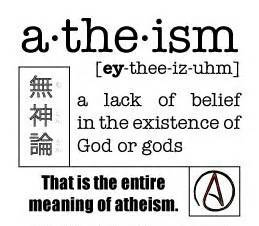How Not to Define 'Atheism'
Nonsense, say I.
Note first that atheism cannot be identified with the lack of theistic belief, i.e., the mere absence of the belief that God or a god exists, for that would imply that cabbages and tire irons are atheists. Note second that it won't do to say that atheism is the lack of theistic belief in persons, for there are persons incapable of forming beliefs about such high-flying topics, infants for example. Charitably interpreted, then, the idea must be that atheism is the lack of theistic belief in persons capable of forming and maintaining beliefs about such topics.
But this cannot be right either, and for a very simple reason. Atheism is something people discuss, debate, argue for, argue against, draw conclusions from, believe, disbelieve, entertain, and so on. Atheism, in other words, is a PROPOSITION: it is something that can be either true or false, that can be the object of such propositional attitudes as belief and disbelief, that can stand in such logical relations to other propositions as entailment, consistency, and inconsistency. But one cannot discuss, debate, argue for, . . . believe, etc. a lack of something. Atheism redefined as the lack of theistic belief is a PROPERTY of certain persons. But a proposition is not a property. Atheism is a proposition and for this reason cannot be redefined as a property.
Someone who understands this might nevertheless maintain that 'negative atheism' is a proposition, namely, the proposition that there are people capable of forming and maintaining beliefs who simply lack the belief that God or a god exists. Admittedly, one could use 'atheism' as the label for the proposition that there are such people. But then atheism so defined would be trivially true. After all, no one denies that there are people capable of beliefs who lack the belief that God exists. Furthermore, if 'atheism' is so defined, then theism would be the view that there are persons capable of belief who have the belief that God exists. But then theism, too, would be trivially true. And if both are true, then they cannot be logical contradictories of each other as they must be if the terms are to mean anything useful.
Now what is the point of the terminological mischief perpetrated by these 'negative atheists'? It is terminological mischief because we have just seen it ruin two perfectly good words, 'atheism' and 'theism.' If atheism and theism are worth discussing, then atheism is the view that no gods exist and theism is the view that one or more gods exist.
The point of the cyberpunk definition is to avoid being pinned down, to avoid being committed to a positive thesis. But of course the claim that there is no God is a positive claim about Reality, namely, the claim that Reality is godless. And so our cyberpunk commits himself nolens volens.



